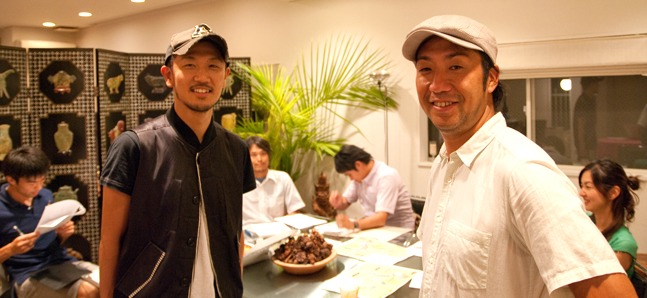
Posted: Tue Oct 12 2010
Taicoclub Camp ‘10 opened its campgrounds and sound systems from Sat Sept 11-Sun Sept 12. The line up was officially announced and those scheduled to attend were greeted by enthusiastic music fans. To find out more about the festival and the philosophy behind it, Time Out Tokyo caught up with the staff behind the event just before it started; Taro Yasuzawa of Koinobori Co, Ltd (organiser) and Tatsunosuke Ide of Infusion Design Inc. (director) tell us more:
Just a few days to go. We thought you’d all be rushed off your feet, but…
TY: Taicoclub is now in its 5th year. We’ve held five spring events and two autumn events and, with the help of our well coordinated staff, we are confident things will go smoothly again this time. Most of our preliminary staff are set to depart for the site either today or tomorrow to put the final preparations in place.
What led to the decision to move this autumn’s event to Niigata?
TI: There were a variety of reasons behind the decision; part of the decision came about from requests made by people who wanted more integrated camping facilities. The type of people who attend Taicoclub are not only used to partying and having fun, but also generally familiar with camping and campsite manners. In addition to a campsite, the New Greenpia Tsunan in Niigata, sits on a 900 acre highland plateau and boasts facilities, such as a hotel with capacity to accommodate 800 guests, hot springs, heated pools, and even go-karts. Outdoor festivals usually require attendees to rough it to a certain degree; however, here they have they don’t have to. In part, we have those who took the time to make their voices heard to thank for the new location.
It’s not often you hear of a festival that takes place twice a year. What led you to hold the event so frequently?
TI: Before Taicoclub started five years ago there weren’t any spring music festivals. By holding two festivals each year the idea was for the Taico festivals to signify both the opening and closing of the festival season. However, the summer festival season seems to now open in spring, and you’ve got festivals like Wire and Metamorphose taking place in autumn – which almost ruins the premise.
TY: The reason we continue holding our events each year, despite all the competition, is because we think our festival is different from the others. We aim to create the kind of festival that we ourselves would like to attend, in exactly the type of environment in which we’d most like to attend it.
TI: Although, unfortunately, we’re always too busy to have as much fun as we’d like to at our own events.
TY: I sometimes wonder if there isn’t someone else out there who would take over from us. I mean, we ourselves started out after going to a festival and thinking we could do that. We’d be pleased if one of our events led someone to think along the same lines.
Taro, you’ve been involved with Taicoclub from the very beginning right?
TY: Yeah, it was me and two others who initially got the ball rolling.
TI: I was originally working as an event organiser, when I got a completely unexpected phone call along the lines of ‘I’ve run a couple of parties already and want to organise a festival’. Upon enquiring about the nature of these ‘parties’ it turns out that they each involved around one hundred people, so needless to say I had my doubts about whether or not they were really prepared to organise a full on festival involving as many as three or five thousand people. Starting Taico on such a steep learning curve was really like suddenly skipping a few rungs on the ladder; plus, continuing the event for five consecutive years without the support from any big promoters, has been tough. For the first two years most people weren’t even sure who was running it.
Did you have any previous connections from the club scene?
TY: I used to go clubbing often, but only really for fun. We think of the name Taicoclub – which people now recognize as a regular event – as symbolizing ‘taiko’ drums, ‘club’ music and our own backgrounds in four-to-the-floor. Although, having said that, it’s really just a name that we put together on the fly because we needed to call ourselves something when we were just starting out. Lately, everyone seems to have abbreviated the name down to ‘Taico’, which is something we’re more than happy with – partly because it seems easier to pronounce even for non-Japanese speaking people.
Apart from being a completely independent music festival, what makes Taicoclub unique?
TY: Most of the artists who play at our events are from the club scene, so the real time to party takes place late at night; however, we’re flexible enough to invite artists from a number of different genres – one of the good things about festivals is that there’s a choice of who to see, guests will often be interested in more than just one particular artist or genre. Rather than heading out with the intention of seeing indie bands and the like, some people just turn up having been motivated by an attitude along the lines of, ‘Let’s go to Kamakura’ – which isn’t really ideal. Plus, many of the lesser-known bands that play at many of the larger festivals get completely overshadowed by big name acts; however, because we have such a mixed line up and only two stages, that’s not the case at Taicoclub.
Playing at the event this year, giving their first outdoor performance in a while, are The Orb; and with such a big act scheduled to appear, we’re hoping that they’ll attract an extra group of fans to the event. However, to us, the important thing isn’t really about attracting big acts, but rather making sure everyone enjoys each day as a whole.
TI: Plus, this time around, just in case anyone gets bored, there’ll also be go-karts, heated pools and even bowling. Some people will prefer partying in the campsite, sleep at say 10pm, wake up early, at like 7am, go for a walk around and then watch their favourite DJ perform from say 9am. The people who come to our events are often as diverse as the line-ups.
From our perspective, as event organisers, it’s very much a handmade festival; along the lines of, ‘We could really do with a signpost over there, any ideas? How about making one using some of that wood over there?’ for example; rather than having someone stand somewhere and shout ‘this way’ to attract attention, we’ve taken the time to try and create a path that can be followed without any extra guidance... The idea behind this kind of thinking is to, as much as possible, try and maintain a sense of freedom. Our security team consists of Japanese-Latin American. The idea isn’t for security to be imposing; they’re even free to dance etc. The idea behind including some extra diversity is to add a heightened sense of freedom and openness. On the other hand, where it’s really necessary, things are done to the book. When Taico started out, there were no manuals for how to run an open-air music festival. Luckily, we both had enough experience to put together a solid framework. Before you can add freedom you first need a solid foundation to work with.
TY: Rather than having a rulebook that says you can’t do this or that, we’d rather people simply come to our events, pick up on the general idea of how to behave and then think for themselves. We aren’t trying to convey any particular message.
Taro, apart from your own of course, are there any other festivals that you particularly like?
TY: Fusion, in Germany. It’s a pretty liberal festival in which everyone helps create an enjoyable atmosphere. The people attending our events help us out in the same way.
TI: Our attendees are great. At an event last year I lost a rucksack containing a pretty substantial amount of money – including an amount set aside for staff expenses. After searching everywhere, all over the grounds, I finally headed back to headquarters only to find that someone had handed it in at lost and found. Better still, everything was exactly as I’d lost it, with nothing missing.
TY: There’s even been a case of someone handing in a ¥10,000 note before.
TI: We’ve never had anybody report things being stolen from tents, and there have only been about three instances of people leaving without taking their tents with them.
Why do you think Taico has managed to build such a strong and moral following?
TY: We’ve never spent a single yen on advertising.
TI: Instead, it's a festival that’s grown through word of mouth. Practically all of the tickets for the spring festival in particular, have been sold through our official website; which means that instead of having to pay agencies, we’ve been able spend more money creating new ideas and giving back to our customers. For example, each year we send a New Year’s greeting card to each of our attendees.
TY: Nobody really wants to bother reading mail that’s been sent out through a mailing list. But greeting cards are almost always warmly received. Plus, we also send out each and every ticket ourselves.
TI: Normally, it’s thought that this kind of personal attention isn’t necessary, but then, we aren’t the norm. For example, each morning of the festival, at 6am, we each pick up a pair of tongs and go litter picking.
One of the best things about creating a festival that feels homemade is that it doesn’t just please the customers, but also the artists. For example, it’s generally thought that accommodating the needs of world famous acts such as Squarepusher, who performed at Taico both last year and the year before last year, can be hard work. However, after explaining that, at our previous venue in Nagano, there wasn’t a hotel to put him up in, he agreed to simply sleep on a futon at a regular minshuku [Japanese guest house]. Others in the industry were like ‘You’ve got to be kidding!’ but in actual fact it turns out that he thoroughly enjoyed performing. Luckily, he seemed to completely understand the situation and simply joined in with everyone else who was trying their utmost to make the event as enjoyable as possible. We’d like to think that maybe he went on to later tell other artists something along the lines of ‘It was really fun, go and see for yourselves!’.
TY: The artists themselves often party until the early hours of the morning and end up staggering around the grounds during the daytime. We’ve taken pictures of audiences from the stage only to later notice various artists in and amongst the crowds, and even had Rei Harakami playing on a slide screaming ‘Waa!’ before.
There’s no doubt that we’ve had our fair share of good luck along the way. One of the reasons Taico has turned into the success story that it has is because, to begin with, we were simply a group of customers who set about trying to create the kind of festival that we ourselves would like to attend. Plus, to a certain degree, our promoters seem to have all followed a similar path. With all the festivals to choose from these days, hopefully, the fact that we were all regular festival goers ourselves is something that helps set Taico apart from the rest.
Lastly, do you ever have any weather-related concerns?
TI: As long as it doesn’t rain it should be relatively warm. A typhoon would be a problem, but we’ve never even had it rain on us before and with a bit of luck we won’t this time either. However, having said that, since the grounds are entirely grassy, it probably wouldn’t hurt to bring some waterproof shoes just in case.
Taicoclub official website: www.taicoclub.com/
Tweets
- About Us |
- Work for Time Out |
- Send us info |
- Advertising |
- Mobile edition |
- Terms & Conditions |
- Privacy policy |
- Contact Us
Copyright © 2014 Time Out Tokyo














Add your comment